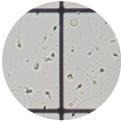検査部のケイトです。

精子の凍結保存には液体窒素の入ったタンクが使われていますが、高い輸送料や融解後のDNA損傷(断片化)の増加(融解時は精子をそのようなダメージから守る工夫をしています)が懸念されます。
多くの動物研究でfreeze-dry法 (乾燥凍結法)が試みられており、それらの結果では遺伝物質は維持されると報告されています。
ヒトの精子を使った研究もいくつかあり、freeze-dry前後で精子のさまざまな因子を測定しています。
“DNA integrity is maintained after freeze-drying of human spermatozoa.” Gianaroli et al. Fertility and Sterility, May 2012.
残念ながら、細胞膜の損失により融解後の運動率や生存率は完全に失われます。
しかしDNAレベルでは凍結前と有意な変化は見られなかったと報告しています。
実用化に向けては更なる研究が必要ですが、インスタントコーヒーのように精子が保存される未来がやってくるかもしれません。
———
Liquid nitrogen is used to cryopreserve sperm, however tanks require storage space, it’s expensive to ship and it can increase DNA damage (fragmentation) after thawing (although we use a special medium to protect the sperm from damage.)
Many animal studies use freeze-dry procedures and their results suggest genetic material is maintained.
There are few studies for human sperm. The following study measured various parameters before and after freeze-drying.
“DNA integrity is maintained after freeze-drying of human spermatozoa.”
Gianaroli et al. Fertility and Sterility, May 2012.
Unfortunately there was total loss in motility and viability after rehydration which indicates cell membrane damage, but there was no significant difference in fragmented DNA compared to the fresh sperm sample.
More work needs to be done before human sperm can be freeze dried and used like instant coffee but a very promising procedure for the future!
